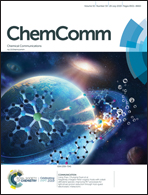Negatively charged metal–organic hosts with cobalt dithiolene species: improving PET processes for light-driven proton reduction through host–guest electrostatic interactions†
Abstract
By incorporating 1,2-benzenedithiol as a chelator to construct cobalt dithiolene species, two negatively charged redox-active metal–organic hosts were obtained. By taking advantage of electrostatic interactions, cationic Ru-based photosensitizers were constrained to improve photoinduced electron transfer processes for efficient photocatalytic proton reduction.



 Please wait while we load your content...
Please wait while we load your content...